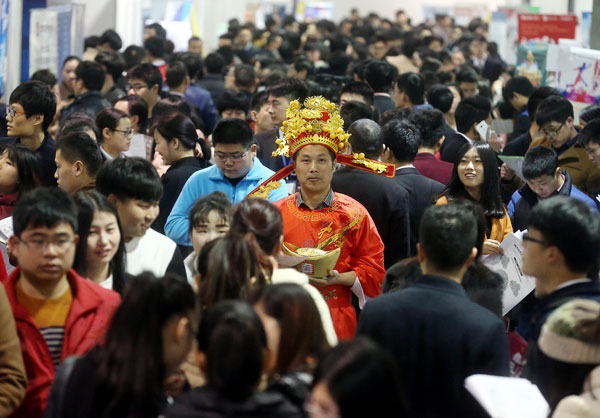China plans to raise age of retirement
 0 Comment(s)
0 Comment(s) Print
Print E-mail China Daily, March 1, 2016
E-mail China Daily, March 1, 2016
 |
|
Representing a company, a worker dressed as the God of Wealth from Chinese legend, attracts the attention of job-seekers at an employment fair in Hangzhou, Zhejiang province, on Feb. 27. [Photo/China Daily] |
China will gradually raise its statutory retirement age over the coming years in a bid to combat the effects of an aging population.
Yin Weimin, minister of human resources and social security, told a news conference on Monday that the current retirement policy "seems to be out of date".
Currently, China's retirement age is 60 for men, 55 for female white-collar workers and 50 for female blue-collar employees.
"The current policy was formulated about 60 years ago when average life expectancy was relatively low. After so many years, life expectancy has increased," said Yin.
"That's not to mention the aging population trend. Last year the number of citizens aged over 60 surpassed 220 million, accounting for 16 percent of the total population.
"Currently, the average retirement age in China is under 55, compared to somewhere in the mid-60s in many other countries. Taking all these factors into consideration, China should raise the retirement age but only step by step until it reaches a reasonable level."
The gradual implementation of a higher retirement age would mean, for example, that a worker who is five years away from retirement when the new policy takes effect would have to work an additional three months, while a worker six years out would work six months extra, Yin said.
Moreover, it will not be applied equally to all sectors of the workforce and a reform plan will be released to solicit public opinion within 12 months, he added.
Jin Weigang, a researcher with the Ministry of Human Resources and Social Security, told China News Service on Saturday that the plan is likely to be implemented in 2022 after a five-year transitional period.
The government's plan to raise the retirement age is a response to the fact that China's shrinking workforce and aging population has begun to bite into the country's labor market and pension system. Population figures show that the number of people aged 16 to 60 fell by 4.87 million to 911 million in 2015, the fourth consecutive year of decline.
On Dec 2, the Institute of Population and Labor Economics and the Chinese Academy of Social Sciences published a green paper on population and labor, in which researchers suggested a two step strategy to changing the retirement age. They recommended that China complete the integration of its two pension systems by 2017 and that from 2018, the retirement age for women should be raised one year every three years, and the retirement age for men should be raised one year every six years.
This means that by 2045, the retirement age for both men and women would be 65.
Layoffs expected; graduates increase
An estimated 1.8 million employees in the iron and coal industry will be laid off in the process of reducing excess industrial capacity in China, according to Yin Weimin, minister of human resources and social security.
"In addition, as they face a slowing economy, many companies with operational difficulties will not generate as many jobs as before," Yin said on Monday.
However, Yin remained positive about the overall stability of the labor market, saying measures would be taken by the government to help the unemployed.
"We will guide enterprises to address downsizing and staff placement through various channels and means. We will create new job opportunities and provide timely employment services and vocational training to promote re-employment of unemployed persons," he said. "We will strengthen coordination among departments, improve the policy environment, strengthen entrepreneurial training, establish service platforms and improve services so that employment will be promoted by entrepreneurship."
The expected layoffs add pressure to an employment market where the number of young job-seekers, including graduates from college and secondary vocational schools, has been increasing annually. Counting graduates from high school and secondary vocational schools, a total of 15 million young job-seekers will be in the market, Yin said.
The employment outlook this year will be grim, with a record 7.65 million university students graduating and entering the country's job market amid a slowing economy.






Go to Forum >>0 Comment(s)